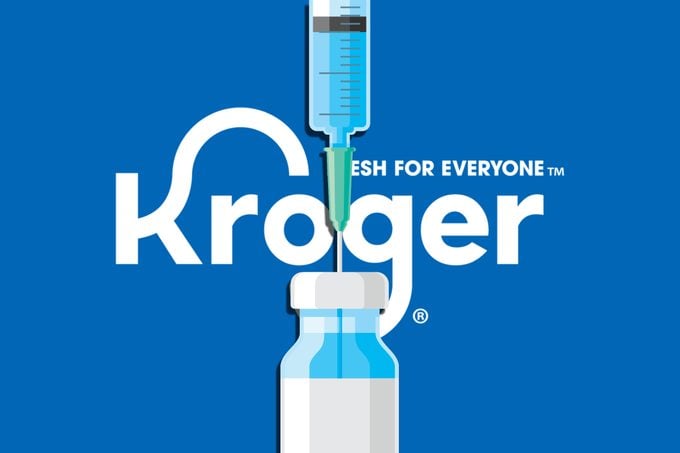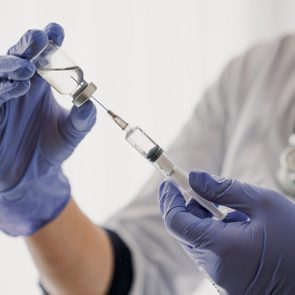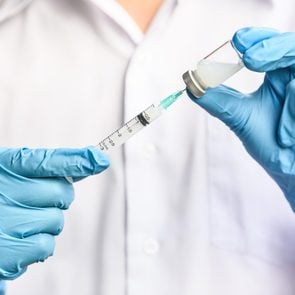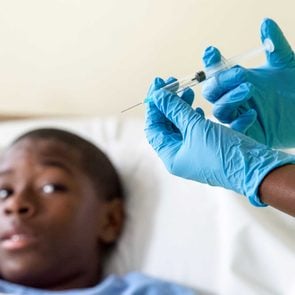How to Get a Flu Shot at Kroger
Updated: Mar. 11, 2022
Need a flu vaccine? Kroger stores are offering shots in more than 2,000 locations in 37 states. Here's how to get your Kroger flu shot.
Getting the Kroger flu shot
Why get the flu vaccine? Not only can it help prevent getting the flu, but if you do get sick, it’ll help ensure you have a milder illness. That’s no small thing, given that every year between 140,000 and 810,000 people get so sick from the flu they have to be hospitalized and 12,000 to 61,000 people die, according to the Centers for Disease Control and Prevention (CDC).
Fortunately, flu shots are easy to get nationwide, including all of Kroger Health‘s 2,258 pharmacies in 37 states and 223 “Little Clinics” in nine states.
“This year it is even more important [to get a shot] because the flu virus presents in some of the same ways that the Covid-19 virus does,’ says LaTasha Perkins, MD, a practicing family physician in Washington, D.C.
Getting the flu vaccine means you’re less likely to get infected with the flu virus and less likely to have your symptoms confused with Covid-19. (Here’s the difference between Covid-19 symptoms vs. flu symptoms.)
Who should get the flu vaccine?
The CDC recommends that everyone over the age of six months should get vaccinated for the flu. Certain people who are at a higher risk of developing complications from the flu are doubly urged to roll up their sleeves. These include elderly folks (65 years and over), people with serious, chronic medical conditions like diabetes, heart disease, and asthma, pregnant women, and small children younger than five years old.
If you have a life-threatening allergy to the vaccine or anything in it you should not get the shot. And if you’ve had Guillain-Barre syndrome (a neurological disorder where the body’s immune system attacks the nerves), are currently sick, or have an egg allergy, talk to your doctor or pharmacist first. Only 20 percent of flu vaccines are grown in eggs so there are plenty of other options if you fall into this group. (Watch out for these deadly flu signs.)
Is the vaccine safe?
Flu vaccines are safe now and have been safe since they were first developed in the 1940s. The different types of flu shots all use inactivated viruses (basically dead viruses) to stimulate an immune response, so there’s no chance of actually getting the flu. There’s also no chance of developing autism. (Here are flu myths you should know.)
The most common side effect you’ll have to worry about (and it’s not a big worry) is a sore arm after the jab. Some people also have a headache, fever, nausea and muscle aches, all of which go away and are a sign that your immune system is working properly. (Here’s how to deal with flu shot pain.)
Is the vaccine effective?
Flu virus strains change every year and so must vaccines. That means effectiveness rates also differ from season to season. If the vaccine matches well with the strains, the CDC says that the vaccine is typically between 40 percent and 60 percent effective. Many times this will prevent you from getting sick but, if you do get sick, you’ll likely have a milder illness.
It’s too early in this year’s flu season to know how well the vaccine and the strains are matched but it’s definitely not too late to get a vaccine.
What kinds of vaccines are available?
“There are multiple versions of the vaccine, but they all have the same functions but are formulated to address the different needs of certain populations,” says Dr. Perkins. For instance, two types (high-dose and adjuvanted) are “more concentrated and created for people 65 and older who are vulnerable to complications from the flu,” she adds. Other flu formulations can be given to anyone and Flublok (the egg-free version) is for those with an egg allergy.
“They all serve the same purpose: to help gain immunity over the year’s virus,” she says.
When is the best time to get a flu vaccine?
If you haven’t already had a shot, you can still get one now. The CDC recommends that you get injected by late October. That time has passed but there are many months you can still be protected, given that the season typically peaks between December and February.
Vaccine manufacturers expect to deliver almost 200 million doses this year, considerably more than last season. Doctors’ offices, clinics, and retailers like Kroger should be stocked up and ready to go. (Remember, it’s never too late for the flu shot.)

How do I get a flu vaccine at Kroger?
Kroger is offering in-store appointments and walk-ins. It’s best to sign up on the website. You can fill out the consent form online which means less time in the store and it also allows Kroger to clean with medical-grade disinfectants between patients. You can book an appointment online—just enter your zip code to find the nearest location.
Most insurance plans, including Medicare, cover flu shots. Otherwise, standard shots (quadrivalent, which protect against four strains of the virus) at Kroger cost $40. High-dose shots (FLUAD), which are recommended for adults 65 and older, cost $75. The high-dose shot contains a protein that triggers more of an immune response. (Adopt these habits to boost your immune system.)
What Covid-19 precautions is Kroger taking?
Kroger meets or exceeds guidelines set by the CDC and other health organizations, including the World Health Organization. All health and wellness spaces now have air filters that screen out viruses and everyone in the store must wear masks. If you don’t have a suitable mask, Kroger will provide you with one.
The Kroger Covid-19 Task Force meets every week to make sure stores are in compliance with the latest recommendations.
Next, learn how to tell the difference between a cold and the flu.

















